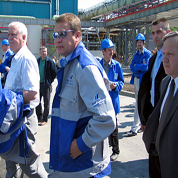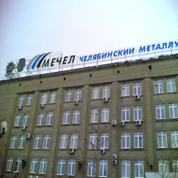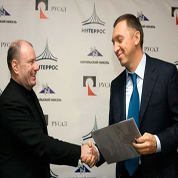Putinís Mechel criticism and commendation

Those avidly tracking major key economic and political events on the Russian market will still clearly remember how Russian Prime Minister Vladimir Putin’s caustic criticism against Mechel and its top management executives exactly two years ago almost put the Russia-based, NYSE-listed mining and metals giant on the fringes of imminent corporate bankruptcy.
Then on July 24, 2008, the companyís share on the local RTS stock exchange, reflecting the drastic negative trends that saw it losing a third of its hitherto robust market capitalization a day earlier on the NYSE, also lost almost 46% of its previous day value, while its market cap was decapitated within 24 hours after the scathing public rebuke. The declines in these parameters resulted from the nervous behaviors of investors, both within and outside Russia, who, fearing the worst, started dumping the metals giantís stocks in droves in a highly contagious bandwagon manner.
“Such a scathing criticism from the Russian prime minister had not been heard against a private company in the country since the high-profile criminal charges against Yukos and its top executives in 2003.”
The subsequent pandemonium almost put the whole of the Russian equity market on the brink of a total collapse as all its major indices nosedived to their historic minimums. Such a scathing criticism from the Russian prime minister had not been heard against a privately owned business entity in the country since the high-profile criminal charges against Yukos and its top executives in 2003 that later led to their imprisonment in May 2005 following a protracted trial.
Ironically, and exactly two years later, the same company and the same top executives were highly complimented in summer 2010 by the same prime minister, who in a display of public remorse, a rare quality for the No. 2 man in the Russian political hierarchy, expressed regret over his sharp criticism two years ago, calling the behavior of the now ‘fully repentant Mechelí an example worthy of emulation by other business tycoons in the Russian metallurgical industry. However, the stock marketís positive reactions following Putinís later approval statement on Mechel fell far short from the highly dramatic negative impacts from the 2008 utterances against the metals giantís equity value and its overall market capitalization on the local and international financial markets.
Investorsí perennial dilemma — the inability to foresee the future
These events ó Putinís initial ruthless criticism and later full absolution of Mechel and praise for its correct behavior ó are telling evidences, a sort of an invaluable case study, on how political statements or public utterances from highly influential political figures can impact on companiesí fates on the Russian financial market and stock exchanges and beyond. However, as most investors did not have prior knowledge of Putinís radical change of mind on Mechel, only few investors, if any at all, were able to capitalize on the new positive reality surrounding Mechel.
 This is one of the key problems facing all the equity investors – the near-absolute inability to foresee and/or know well in advance all factors that can influence companiesí equity values and stock markets at any given time. Indeed, from time immemorial, or more appropriately from the moment of initiation of the current system of speculative creation of Ďeasy wealthí on the equity markets, stock investors have always wanted to know all the interconnected factors that daily impact on both the behavior of the global equity markets as well as the stocks of different companies that are listed on these platforms.
This is one of the key problems facing all the equity investors – the near-absolute inability to foresee and/or know well in advance all factors that can influence companiesí equity values and stock markets at any given time. Indeed, from time immemorial, or more appropriately from the moment of initiation of the current system of speculative creation of Ďeasy wealthí on the equity markets, stock investors have always wanted to know all the interconnected factors that daily impact on both the behavior of the global equity markets as well as the stocks of different companies that are listed on these platforms.
As history has shown, most speculative stock investors have not been able to really master this art to perfection, despite the huge knowledge and IT metrics now available to modern stock brokers, while the very few among them, who have been able to do so, are not always lucky to win all times in their transactions on the exchanges. The end result is that billions of dollars/euros/rubles are lost and the same amount is gained daily by different stock brokers and equity investors on major stock exchanges across the world.†
Examples illustrating the difficulties associated with the inability to have accurate advance knowledge of and/or reliably forecasting the probable impacts that certain negative future factors would have on a given stock abound in millions. A perfect example of this dilemma is the above-mentioned Putin-Mechel criticism case that occurred in July 2008, when Russian, and indeed, the whole of the global investment communities became live witnesses to the devastatingly negative impacts that the prime ministerís high-profile, verbal public attack on the metals giant, including an overtly threatening promise to send medical doctors to the companyís CEO and an army of law-enforcement officials to investigate the companyís pricing policies ó had on the domestic and global equity exchanges.
Putinís anger was particularly fueled by the failure of the companyís principal shareholder and CEO, Igor Zyuzin, to attend a vital government meeting chaired by the prime minister himself for Ďallegedly being in a poor health condition,í hence the latterís stern promise to send him a very good medical doctor to treat and speed up his convalescence process. ďZyuzin was supposed to be present here today, but he suddenly fell sick. By the way, his company sold its products abroad throughout the first quarter at prices that were twice lower than those on the domestic, and hence, global markets. Question: where is the take for the government in form of taxes?Ē Putin asked. ďDisease, of course, is disease, but Zyuzin ought to get well very quickly, otherwise, I shall have to send him a doctor to treat all his problems, along with the Federal Antirust Agency (FAS), and probably, might also have to ask the General Prosecutorís Investigative Committee to help clarify what is actually going on in this company.Ē
Prudent equity investors and outright stock speculators, armed with the robust fundamental data on the state of Mechel and expertsí strongly positive favorable forecast outlooks on the companyís future ó had been buying up the metals giantís stocks with the justified aim of making profits from the rising value of the stocks in the future However, most of these investors met with fiasco, as they could not foresee the Russian prime ministerís ďanimated anger and caustic criticismĒ against the mining giant in general, and its CEO, in particular.
According to the Russian and foreign exchangesí data, the prime ministerís unprecedentedly harsh criticism, which was reminiscent of some of the deadly charges against the now-defunct Yukos oil corporation and its ex-owner, Mikhail Khodorkovsky and other top company executives currently serving long prison terms, shook the Russian stock market to its very foundation. It, therefore, came as no surprise that the previously strong performing Mechel stocks went down like a bunch of cards, as they lost 45.6% of their market value registered prior to Putinís criticism, forcing the companyís market capitalization to dip by about $6bln, a record, one-time loss in the whole of Russian corporate history, while the capitalization of the local stock market lost an unprecedented sum of over $60bln, all in a span of a couple of days.† Later, FAS fined Mechel 790mln rubles, a sum the company happily paid to put the ugly incidence behind it.
A rare praise from Putin for a private business entity
In mid-summer 2010, Putin did not only simply express regrets about his caustic criticism against the metals giant, but even went further to compliment the company, calling it Ďone of the most responsible corporations in the Russian steel industry in terms of signing long-term contracts and adjustment of its pricing policies,í and called on other metals tycoons and their companies to follow Mechelís sparklingly outstanding example. ďIt turns out that Mechel can work normally. I remember my attack on the company two years ago and today can only regret that it led to a sharp fall in its market capitalization,Ē the influential prime minister told a gathering of the nationís top investors and companiesí owners in the metals industry. ďI can only thank Mechelís management and its owner and CEO for doing everything that we had discussed and for correct corporate behavior afterward.Ē
ďPutinís initial ruthless criticism of and later praise of Mechel for its correct behavior are telling evidences of how influential political figuresí public statements can impact on companiesí fates in Russia.Ē
†
In a related case, President Dmitry Medvedev has reportedly ordered Yuri Chaika, the nationís general prosecutor, to look into an ongoing heated corporate dispute between ó Oleg Deripaska, the owner of RusAl, a major metals conglomerate and Vladimir Potanin, the owner of Interros, a huge industrial-financial group ó two of the countryís highly influential business partners and equal stake owners of Norilsk Nickel, the nationís largest producer of nickel that are currently disputing the decisions taken at a recent Norilsk Nickel board meeting, where Deripaska had claimed massive falsifications of the voting results. The bone of contention arose when Interros with the same number of equity stake as RusAl got four seats on the new board against the latterís three. Unable to resolve the case amicably, Deripaska penned a petition to the Russian president, forcing the latter to order a thorough investigation into the issue.
Like the prime ministerís involvement in the Mechel price-manipulation case, the presidential intervention into the alleged illegal manipulation of the Norilsk Nickel board composition and the voting procedures has impacted on the companyís stocks value. Only a few with the prior knowledge of Kremlinís involvement in this case were able to gain from resultant fluctuations in the companyís stock value.
Mechel uses its political connections to its advantage
These two cases once again highlighted the relevance of the time-tested axiom, which says only people with confidential insider information and/or knowledge on the state of a companyís stocks or imminent adoption of critical decisions that will have direct or implied negative implications for particular stocks, are in a position to know in well in advance all the possible market dynamics, factors and trends that are likely to boost or pull down the value of such stocks.
 It is a well known fact that any illegal use of confidential insider information directed at securing private self-enrichment or for generating profits for corporations and/or using such knowledge to harming third parties, including the state and its interests, is a huge criminal offence punishable under laws, with all the consequent negative repercussions for the culprits, irrespective of statuses. However, the issue of insider information will be a topic for another future publication in this journal, and not this current one that focuses on the impacts of Russian politics and key political figures ó evident from the recent Mechel and Norilsk Nickel incidents, and farther in Russian corporate history, from Yukos oil corporationís cases ó on the nationís economy in general, and its stock market and companiesí capitalizations, in particular.
It is a well known fact that any illegal use of confidential insider information directed at securing private self-enrichment or for generating profits for corporations and/or using such knowledge to harming third parties, including the state and its interests, is a huge criminal offence punishable under laws, with all the consequent negative repercussions for the culprits, irrespective of statuses. However, the issue of insider information will be a topic for another future publication in this journal, and not this current one that focuses on the impacts of Russian politics and key political figures ó evident from the recent Mechel and Norilsk Nickel incidents, and farther in Russian corporate history, from Yukos oil corporationís cases ó on the nationís economy in general, and its stock market and companiesí capitalizations, in particular.
These cases have clearly shown that any company can rise to the pinnacle of its industry in geometrical progression rate as it can also equally fall from Ďgrace to grassesí within a twinkle of an eye in this country at the whims of the powers that be. Therefore, the ability to successfully leverage political connections to oneís competitive advantage on the national marketplace is a huge business asset in this part of the world. Mechel, by all indications, seems not only to have mastered this philosophy, but also to have aptly applied it to suit its corporate goals on the Russian market.












 Web design,
Web design,